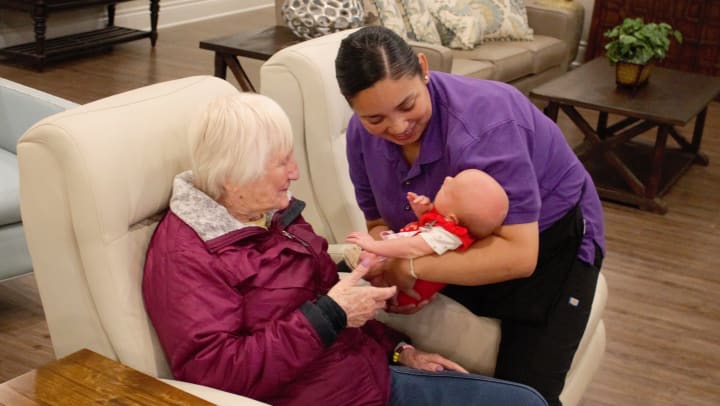Since intergenerational programs work based off what both age groups can bring to the other, you may be wondering if this is appropriate for your loved one with dementia. It has been shown in research that seniors with cognitive impairment work best when paired with younger children or babies and have so much to offer them, despite their conditions. Some programs have seniors feeding a bottle to a younger infant, reading books, or simply holding the child. These activities may seem simple but help to reduce any agitation in the senior while enriching the life of the young child at the same time.
The next question you may be asking yourself is what to look for in an Intergenerational Program and we have a few tips for that as well. These programs work better when it’s a regular, long-term program with constant chance for interaction. If there are multiple programs you are interested in, we recommend picking one that’s better for your loved one’s schedule while still maintaining a constant program. For instance, if there is one that meets once a month versus once a week and your loved one has been very isolated, research suggests that more visits would be highly beneficial for your loved one. It also is a good sign when the program meets on a consistent basis with the same group of children. This allows bonds to form, and trust will grow between the old and young, making their interactions even more outstanding and beneficial.
Considerate preparation and planning make all the difference in the success of intergenerational activities. Senior living community staff and the organizations or schools they partner with need to consider the capabilities and backgrounds of everyone who will be involved and adjust their activities accordingly. A part of preparation may be explaining to the senior ahead of time who they are meeting and what the planned activity will be. Many seniors, especially those with dementia, have a hard time with things that deviate from their everyday routine. Giving them even an hour’s heads up can be the difference in a good visit and a hard one.
It also may include prepping any children who are getting involved in one of these programs for the first time. While children who see seniors regularly may have an advantage, children new to the program may become frightened when seeing a senior who is in a wheelchair, sick, or showing obvious symptoms of Alzheimer's or other form of dementia. Explaining what they may see and giving them a break if they get too overwhelmed may be necessary.
While children who see seniors regularly have an advantage in intergenerational interactions, children who do not may become frightened when seeing a senior in a wheelchair or someone who is sick. This often leads to seniors and children both having a negative experience. Children should receive preparation about what they may see ahead of the event and be comfortable interacting with seniors. Seniors may also need breaks from visits, especially those with dementia as they are prone to getting overstimulated and overwhelmed which causes agitation and behaviors.
If you are not able to find a program immediately, Generations United offers a database that allows you to search for these programs, local to your area. Contact an Iris Memory Care location in your area and ask for the Life Enrichment Department and see about doing local volunteering. This may take time, as building most relationships does, but the result in the end is so incredibly beneficial for all parties involved.


